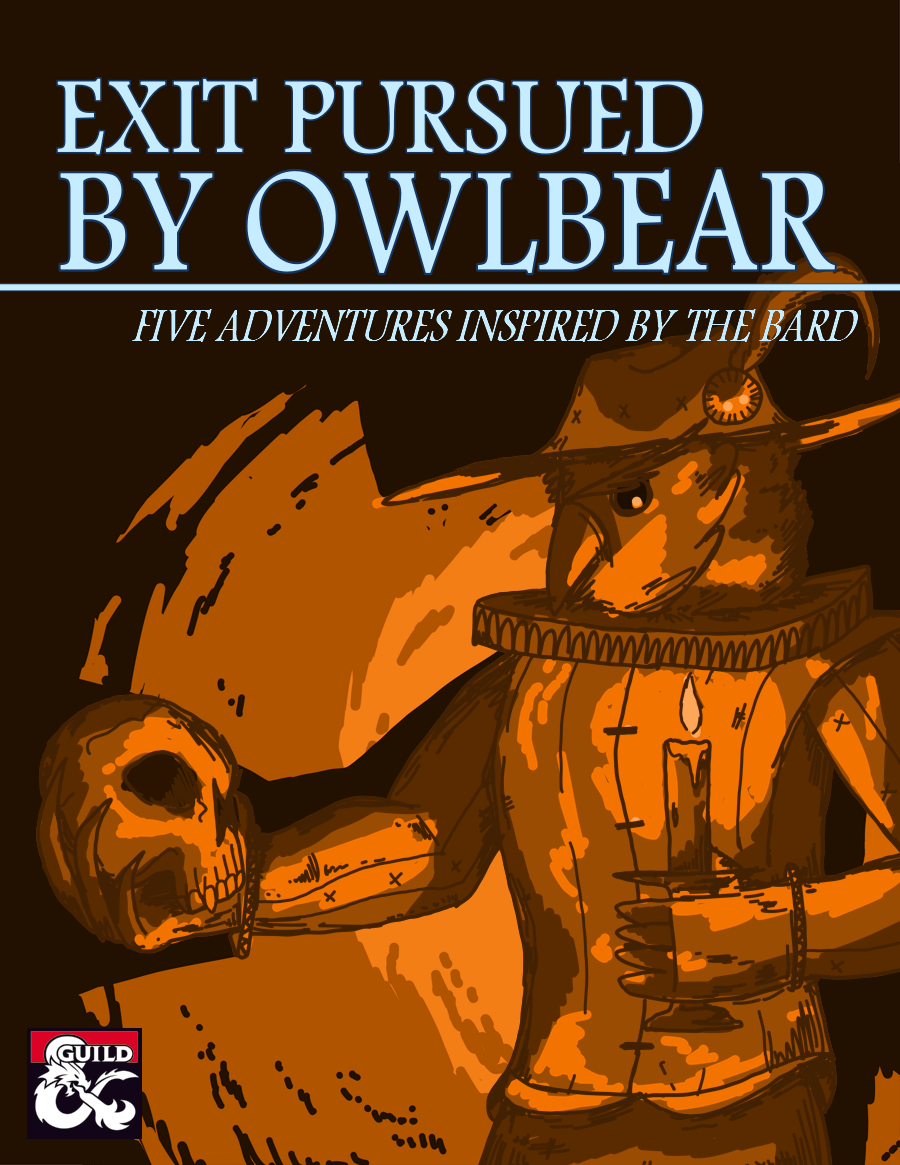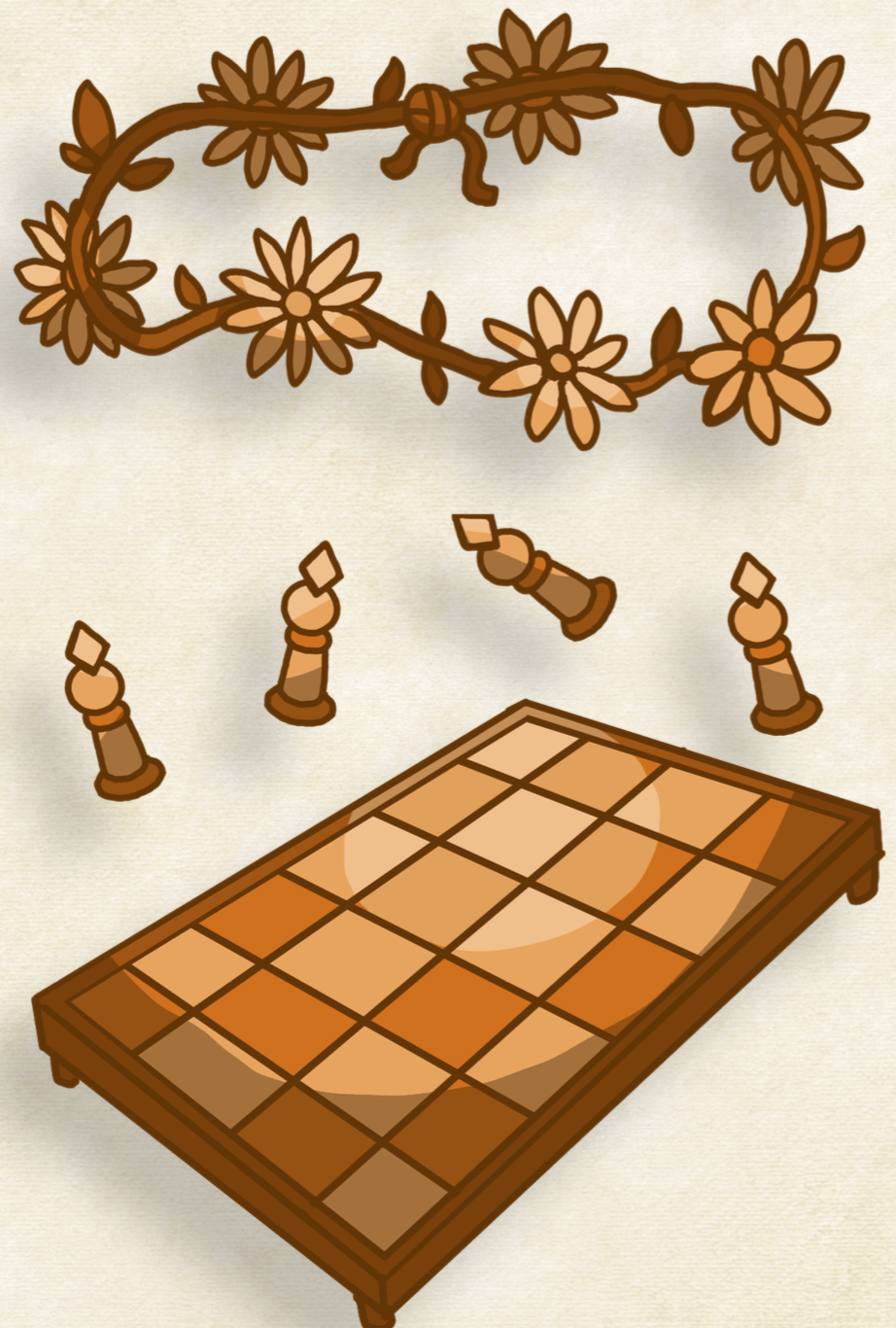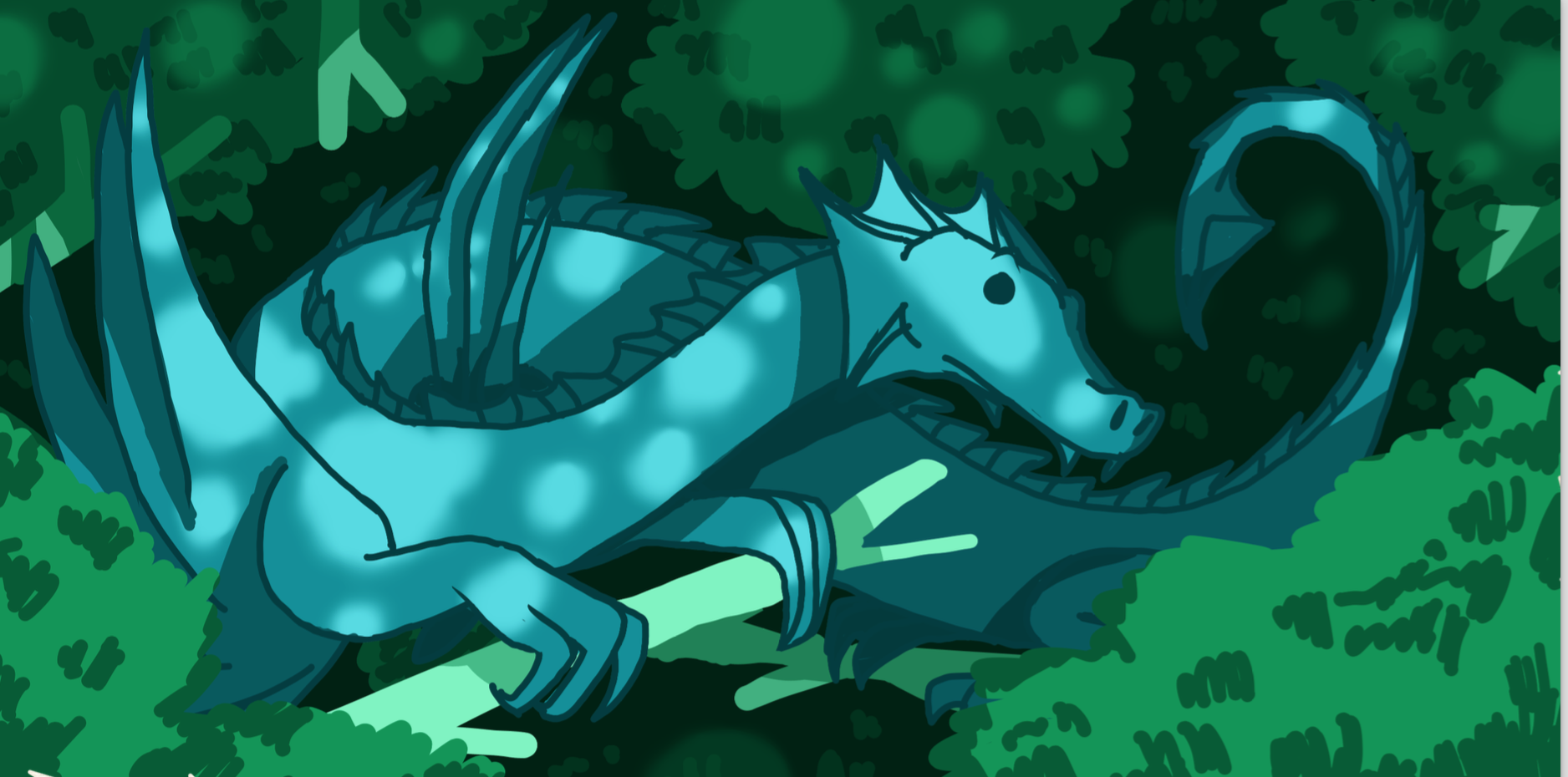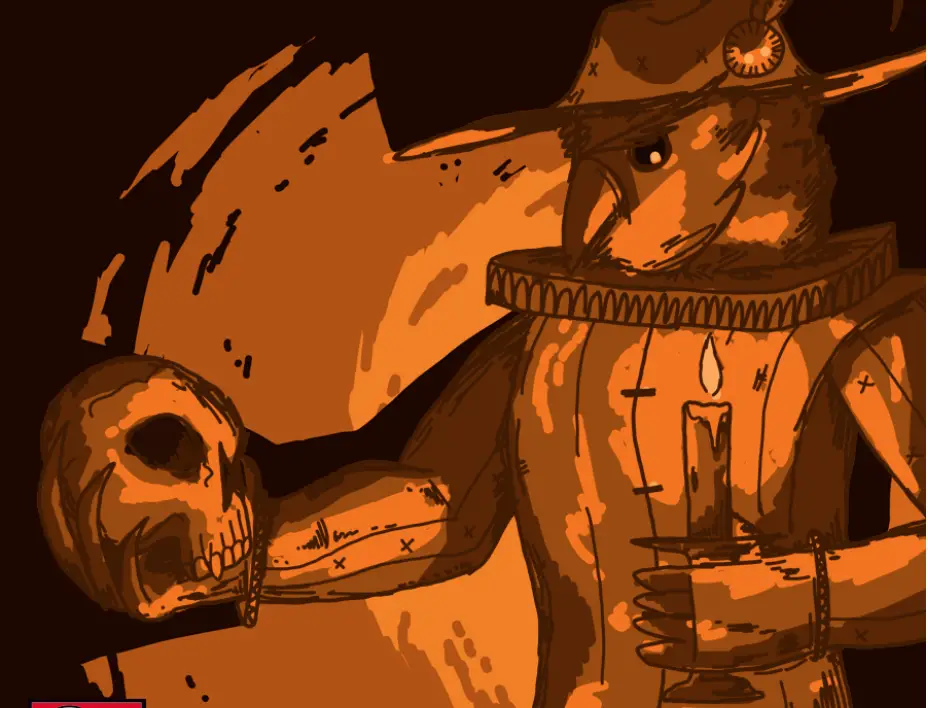Tabletop RPGs are an incredibly suitable medium for adaptations. The freedom afforded to the GM and players through roleplaying allows for engaging with a favorite property in a brand new context, with a new flavor. Exit Pursued by Owlbear carefully plots out five adventures that show reverence to some of Shakespeare’s most notable plays, while still finding ways to twist those stories into ones that fit the D&D system.
Product Manager E.R.F. Jordan, whose other work includes the Mythic Encounters series, assembled a talented group of writers to give fresh perspectives on these tried and true plays. After going over the review copy of this collection of adventures, I was able to run the Hamlet adventure called The Rose of the Fair State for a group of players that included a Shakespeare enthusiast. My thoughts are elaborated on completely for that adventure, but there will be thoughts on the other adventures below. If you are more interested in broad thoughts, then feel free to skip ahead to The Verdict? section.

A Rose and a Thorn
As mentioned in the introduction to this article, the adventures contained in Exit Pursued by Owlbear have fun new approaches to the Bard’s work and The Rose of the Fair State by Ashton Duncan is no different. However, this unique spin on Hamlet does come with its faults.
The story presents Ophelia as the main NPC and quest giver, providing some fascinating advice for expanding on the character presented in the play. However, the adventure doesn’t give many clear opportunities to engage with Ophelia’s motivations beyond the initial meeting with the adventurers. The strength of Ophelia as a character may be slightly roleplay-dependent, as with many prominent NPCs, but there still could have been more opportunities to actively include her in the action.
The story of this adventure operates on the periphery of the base Hamlet story, allowing for new plot points and even an opportunity to subvert the very tragedies that Hamlet is built on. However, this removal from the story of Hamlet was particularly stark in the Act 1 of this adventure, which my players felt subtracted from the rest of the story. The enjoyable scheming that this adventure provides grounds for truly thrives in Act 2, which could have easily been expanded forward into Act 1.
Magic and supernatural occurrences are not just a staple of D&D, but also very present in Shakespeare’s stories, including Hamlet. A Rose of the Fair State feels lacking in that quality, with the only distinct D&D elements integrated being changing some of the characters of the story to D&D ancestries. It felt like a missed opportunity to not include the ghost of Hamlet Senior in an adventure that could have played with that supernatural element.
The adventure struggles to stick the landing in its final act due to a lack of clear hook between the conclusion of Act 2 and the start of Act 3. The structure of the adventure just assumes that the adventurers will go along with what is requested of them in Act 3, without giving much context to the DM or players as to why they’re required to undertake the presented task. This ended up causing a refusal to take on this new request from the characters and did not provide them with the same level of engagement in the finale of the adventure.
Aside from the clear structural issues, this adventure does have a solid concept. As a quick set of missions, it was effective and fun to run. While it may not work perfectly on its own, it does stand as a strong template for any DM who would like to integrate Shakespeare’s stories into their own campaign or run a series of (generally) light adventures.

Shrewd Analysis
The next adventure is called A Shrew’s Vengeance, which takes a critical look at The Taming of the Shrew. This adventure’s author, Jessica Marcrum, is able to provide a nuanced take on the misogyny and abuse present within the source material. In terms of tone, this adventure does feel a bit clunky. On the one hand, it has a delicate take on gaslighting, neglect, and abuse, interfacing with how such things have affected Katherine. On the other hand, the vengeance plot’s use of magical trickery somewhat trivializes the important subject matter. Later on, the adventure takes a more serious turn, following the introduction of an original character named Count Christopher Sly. Count Sly is a fun inclusion in a vacuum but feels a bit out of place as a minor character. Perhaps if the focus of the story had been slightly shifted, this adventure could have functioned a bit better.

Oh, Puck!
This collection also includes If We Shadows Have Offended by R. Morgan Slade, which very loosely pulls from A Midsummer Night’s Dream. The adventure takes the character Puck as well as some elements of the fairy’s trickery to put together an original adventure. The stakes are low, but there is still some delightful design. Puck organizes a game of Forest and Faeries that creates a game within a game structure for this adventure. Forest and Faeries calls for trial-and-error discovery of the rules of the game, similar to games like Mao.
Depending on the group of players, this could be very entertaining or very frustrating. The gameplay isn’t entirely intuitive, especially with a “soliloquy” mechanic that isn’t really hinted at in any formal manner. There are also some layout issues, including a missing section of Puck’s dialogue in the conclusion (However, as I will note later on, the layout and presentation overall are well-done). In terms of light fun, this adventure is worth trying out, but is, again, not ideal for every group.

If You Give a DM a Cookie
Much Ado About Cookies by Noah Grand takes on a Shakespeare play that I am admittedly not well-versed in, Much Ado About Nothing. This adventure has some of the best integration of D&D elements into it, yet it is also slightly difficult to track the plot when lacking familiarity with the play. The plot is outlined in the introductory sections of the adventure, which includes useful summaries in the Adventure Overview section (it should be noted that this is the only adventure that includes such summaries).
However, the adventure could have done a better job presenting what information the faerie dragon Avon is privy to as a guideline for the DM. As the title suggests, this adventure includes a cookie subplot. I found this subplot and related elements to be a little too silly, even when compared to the lightheartedness of the rest of the story. Regardless, this adventure does provide many fun roleplaying opportunities, while still delivering strong exploration and combat aspects. Similar to most of the adventures contained within this collection, it will best serve your group if you make the style of this adventure clear before running it.

Bubble to the Surface
The last adventure presented in this collection is Bubble, Bubble, Toil and Trouble by Tessa Simpson, which is adapted from Macbeth. This particular adventure is solid all-around, but has one glaring issue: if your players are familiar with Macbeth, then much of the suspense of this adventure’s mystery is lost. Of course, most groups could likely exclude their external knowledge from their roleplaying, but I find that mysteries are best in D&D when characters and players are equally ignorant. This adventure is basically at the other end of the spectrum from The Rose of the Fair State, where both adventures could have found more of a happy middle ground between being adaptations and reimaginings.
Beyond that issue, Bubble, Bubble, Toil and Trouble does an excellent job throwing the adventurers into the action. The PCs could probably have slightly more agency in their uncovering of the mystery of the story. The story does, however, provide for less binary developments through their interactions with some of the NPCs, allowing for an engaging story as a whole. This adventure also includes an original Warlock subclass for the Graymalkin patron. This subclass covers similar territory as the Fathomless subclass from Tasha’s Cauldron of Everything, but has some unique flavor and smart design choice to justify its inclusion.

The Verdict?
Exit Pursued by Owlbear is an anthology that could have easily been a bland collection of retellings. Instead, it includes commendable efforts to modernize these classic stories (such as Much Ado About Cookies giving the opportunities to alter the genders of the central lovers), and apply them to the D&D system.
Although I was impressed by the original takes written in this anthology, they were not without issues. The structure of some of the adventures could have used some adjustment. Additionally, the tones of these adventures aren’t perfectly balanced.
Still, there are a lot of excellent design choices included within these 38 pages, such as a rollable table of Shakespeare insults and intelligent designs for investigating and exploring. The layout is one of this adventure anthology’s strongest elements, making any of the adventures easy to understand as a DM. E.R.F. Jordan’s art style also adds another layer of charm. I would recommend giving this adventure anthology a shot if you’re a fan of Shakespeare or desire more whimsical adventure ideas.
You can grab a copy of Exit Pursued by Owlbear on the DMs Guild, which is currently running a sale for this and other products!
Images and review copy via Exit Pursued by Owlbear team
Have strong thoughts about this piece you need to share? Or maybe there’s something else on your mind you’re wanting to talk about with fellow Fandomentals? Head on over to our Community server to join in the conversation!

